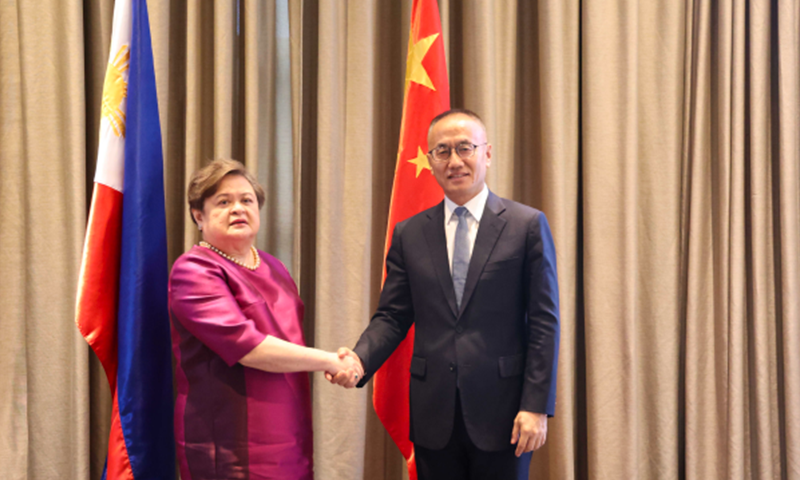Chinese experts take a 'wait-and-see' approach on latest China-Philippines consultation on South China Sea

Vice Minister of Foreign Affairs Chen Xiaodong and Philippine Foreign Undersecretary Theresa Lazaro co-chaired the 9th meeting of the China-Philippines Bilateral Consultation Mechanism on the South China Sea (BCM) in Manila on July 2, 2024. Photo: Chinese Foreign Ministry
Although China and the Philippines have agreed on a need to restore trust and create conditions for productive dialogue on the South China Sea issue during the latest round of crucial consultations, some Chinese experts said on Wednesday that they will take a "wait-and-see" approach given that Manila frequently "says one thing but does another," and it remains to be seen whether the Philippines can truly fulfill its commitment to de-escalate the situation.
Chinese Vice Minister of Foreign Affairs Chen Xiaodong and Philippine Foreign Undersecretary Theresa Lazaro co-chaired the 9th meeting of the China-Philippines Bilateral Consultation Mechanism on the South China Sea (BCM) in Manila on Tuesday, according to a readout released by the Chinese Foreign Ministry on late Tuesday night.
Both sides engaged in candid and constructive exchanges on the South China Sea situation, particularly on managing the situation at China's Ren'ai Jiao (also known as Ren'ai Reef). China reiterated its sovereignty over the Nansha Islands, including Ren'ai Jiao, and the adjacent waters, asserting its sovereign rights and jurisdiction over relevant maritime areas, the Chinese ministry said.
China also urged the Philippines to immediately stop maritime infringements and provocative actions, and to abide by the provisions of the Declaration on the Conduct of Parties in the South China Sea (DOC), asking the Philippines to return to dialogue and consultation to properly handle disputes.
Both sides acknowledged that maintaining peace and stability in the South China Sea serves the interests of both countries and is a common goal across the region. They agreed to continue dialogue and consultation through mechanisms like the BCM to manage contradictions and differences.
During the meeting, both sides also exchanged views on enhancing maritime communication mechanisms, promoting dialogue between their coast guards, and advancing cooperation in marine science, technology and environmental protection.
This is the first formal dialogue between the two sides since the China Coast Guard (CCG)'s interception, boarding, inspection and expulsion of Philippine vessels when they illegally intruded into waters near Ren'ai Jiao on June 17, according to media reports.
The Department of Foreign Affairs (DFA) of the Philippines said in a statement that noting recent incidents in the South China Sea, "both sides recognize that there is a need to restore trust, rebuild confidence and create conditions conducive to productive dialogue and interaction," the Philippine News Agency reported on Tuesday.
However, Philippine Rear Admiral Roy Vincent Trinidad, a navy spokesperson on South China Sea issues, was quoted as saying in a Reuters report on Tuesday that the CCG's actions against Philippine vessels on June 17 were the "most aggressive" in recent history.
Since last year, China and the Philippines have held several rounds of dialogue, but overall, the interactions between China and the Philippines regarding Ren'ai Jiao, Huangyan Dao (also known as Huangyan Island) or other sensitive South China Sea issues have shown a common characteristic: diplomatic consultations and frontline confrontations are two separate issues, Chen Xiangmiao, director of the World Navy Research Center at the National Institute for South China Sea Studies, told the Global Times on Wednesday.
"Whether the consensus reached through diplomatic consultations can be implemented at the frontline for risk control and conflict prevention is hard to say," Chen said. "Moreover, most of the time, the Philippines says one thing but does another."
On one hand, the Philippines maintains consultations, but on the other hand, it remains quite tough on issues including Xianbin Jiao and in its verbal statements. Recently, the Philippines has also hinted that it will adopt a new supply model for the Ren'ai Jiao, experts said.
Multiple pieces of video footage obtained exclusively by the Global Times show that aside from dispatching military personnel, the Philippines arranged for its so-called fishermen to transport construction materials to reinforce the military vessel illegally grounded at Ren'ai Jiao, and Philippine military personnel openly conducted reinforcement work on the "grounded" warship during the daytime.
"While Beijing's door to negotiations is always kept open, Manila, due to maritime and public opinion pressure, has to return to the negotiating table," Chen noted.